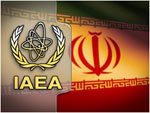 Reuters: The U.N. nuclear agency said on Tuesday Iran must address concerns about its suspected atom bomb research, one day after Tehran alleged that “terrorists” had infiltrated the organization to sabotage the Islamic Republic’s uranium enrichment plants.
Reuters: The U.N. nuclear agency said on Tuesday Iran must address concerns about its suspected atom bomb research, one day after Tehran alleged that “terrorists” had infiltrated the organization to sabotage the Islamic Republic’s uranium enrichment plants.
By Fredrik Dahl
 VIENNA (Reuters) – The U.N. nuclear agency said on Tuesday Iran must address concerns about its suspected atom bomb research, one day after Tehran alleged that “terrorists” had infiltrated the organization to sabotage the Islamic Republic’s uranium enrichment plants.
VIENNA (Reuters) – The U.N. nuclear agency said on Tuesday Iran must address concerns about its suspected atom bomb research, one day after Tehran alleged that “terrorists” had infiltrated the organization to sabotage the Islamic Republic’s uranium enrichment plants.
Britain added to the pressure on Iran before talks later on Tuesday between the European Union’s foreign policy chief and Iran’s nuclear negotiator, saying Western nations would step up sanctions against Tehran if negotiations failed.
Israel has issued more threats to attack Iran to prevent it from acquiring nuclear weapons, injecting new urgency to stalled efforts to resolve the long-running nuclear dispute with Iran by diplomatic means.
Iran says its nuclear program is peaceful but its refusal to curb work which can be used to build atom bombs has drawn increasingly tough Western sanctions limiting its oil exports.
“We will be intensifying those sanctions in the coming weeks and months in the absence of successful negotiations,” British Foreign Secretary William Hague said in London.
But he also made clear the West’s opposition to Israeli strikes on Iran, which many analysts say could cause a wider Middle East conflict and hurt an already fragile world economy.
Britain’s advice to Israel “has been very clear, that in these circumstances…we are not in favor of a military strike on Iran,” Hague told a parliamentary committee.
Israel is believed to have the Middle East’s only nuclear arsenal, although it refuses to disclose any capability, while Iran’s eastern neighbor, U.S.-allied Pakistan, is also nuclear-armed.
Israel sees Iran’s atomic ambitions as a mortal threat and says sanctions are failing to make Tehran change course. The United States says diplomatic pressure can still work.
In a new test of that belief, European Union foreign policy chief Catherine Ashton was due to meet Iranian nuclear negotiator Saeed Jalili in Istanbul on Tuesday evening.
Ashton is leading negotiations with Iran on behalf of six world powers – including the United States, Russia and China as well as three EU heavyweights – which have made little headway since they resumed in April.
Separate efforts by the U.N.’s International Atomic Energy Agency (IAEA) to unblock its investigation into possible military dimensions to Iran’s nuclear program also appear deadlocked despite a series of meetings since January.
“TERRORISTS AND SABOTEURS”
IAEA Director General Yukiya Amano told Iranian nuclear energy chief Fereydoun Abbasi-Davani that it was essential for Iran to cooperate with his inspectors to help allay their concerns.
They met on Monday just hours after Abbasi-Davani sharply criticized the U.N. body in a speech to its 155-nation annual assembly in Vienna.
Amano told Abbasi-Davani the IAEA “is committed to continued dialogue…and expressed the readiness of agency negotiators to meet with Iran’s in the near future”, a statement said.
Western diplomats said they expected the next IAEA-Iran meeting to be held in October but the venue is still unclear.
In a sign of the depth of mistrust between Iran and the IAEA, Abbasi-Davani accused the U.N. agency of a “cynical approach” and mismanagement in his speech on Monday.
He said power lines to Iran’s Fordow underground enrichment site were blown up a month ago and that an IAEA inspector had asked for a visit to the site a day later.
“Terrorists and saboteurs might have intruded” into the agency, he said.
Abbasi-Davani did not say who he believed was behind the sabotage. Iran has often accused Israel and its Western foes of trying to damage its nuclear work.
Western diplomats dismissed the Iranian allegations against the IAEA as an attempt to divert attention from Tehran’s stonewalling of the agency’s inquiry.
“Iran’s accusations against the IAEA are a new low. Increasingly cornered, they are lashing out wildly,” said nuclear proliferation expert Mark Fitzpatrick of the International Institute for Strategic Studies think-tank.
(Additional reporting by Maria Golovnina in London; Editing by Angus MacSwan)


